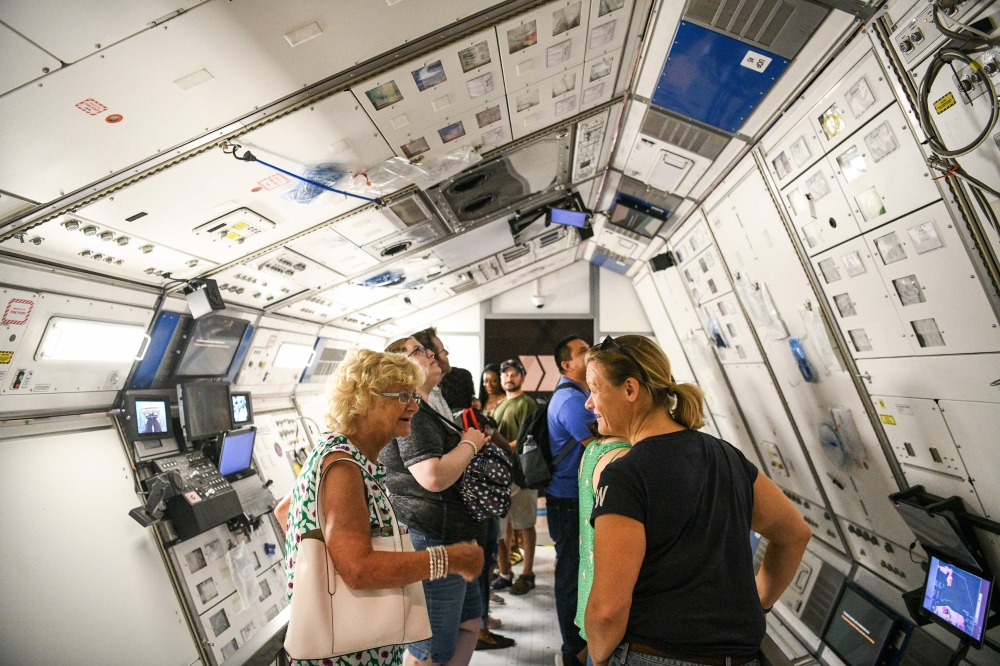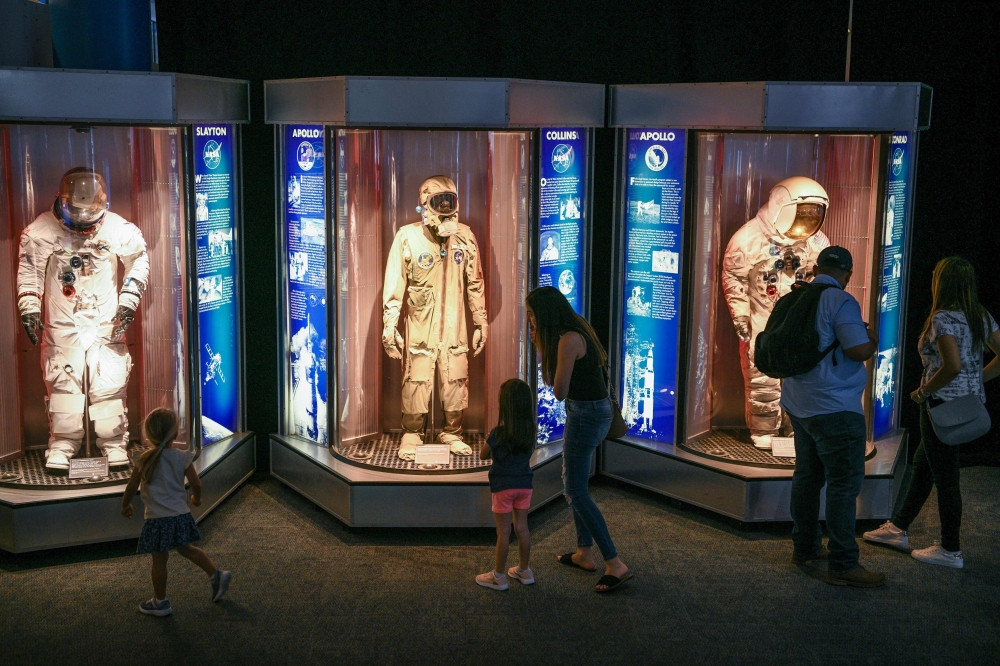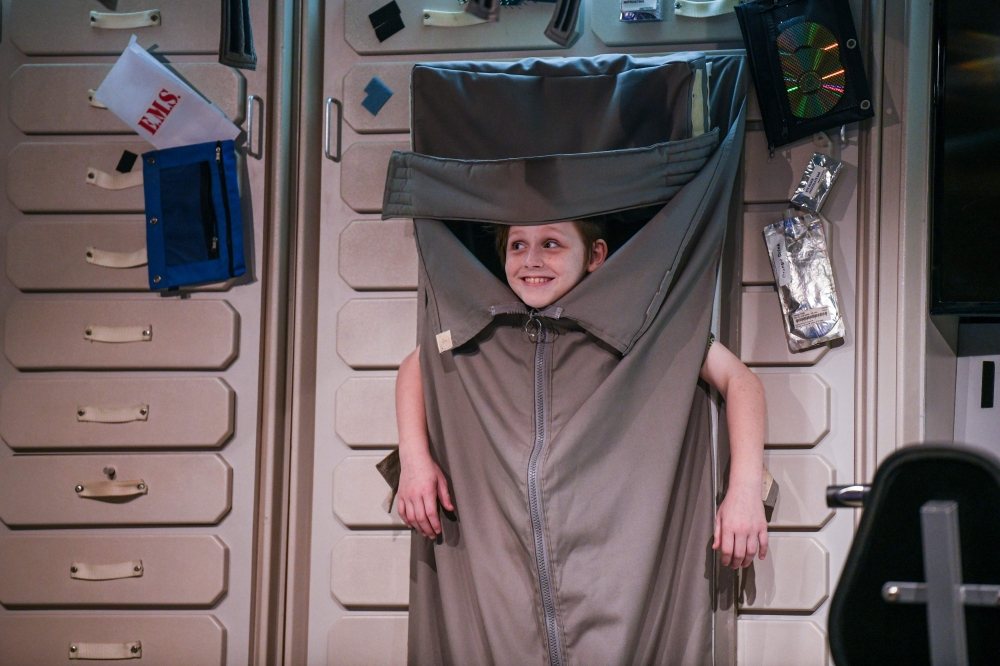- City Fajr Shuruq Duhr Asr Magrib Isha
- Dubai 04:25 05:43 12:19 15:46 18:50 20:09
"That's one small step for man, one giant leap for mankind": it was with these words that Neil Armstrong became the first person to set foot on the Moon 50 years ago, an occasion celebrated by space enthusiasts globally Saturday.
The era-defining event was watched by more than half a billion people around the world, and represented one of humanity's greatest achievements.
In the US, its 50th anniversary has revived public enthusiasm for crewed space flight, as NASA charts out new missions to the Moon and on to Mars.
At 4:18pm ET (2018 GMT) on July 20, 1969, the lunar module carrying Armstrong and crewmate Buzz Aldrin touched down on the Sea of Tranquility, following a four-day journey.
NASA replayed the original CBS footage online.
"Houston, Tranquility Base here. The Eagle has landed," Armstrong said.
A little over six hours later, at 10:56pm ET (0256 GMT Sunday), Armstrong stepped on the lunar surface and uttered his immortal words - which he later said he thought about during the flight and prior to exiting Eagle.
Aldrin followed about 20 minutes later, exclaiming: "Magnificent desolation."
The pair spent about two-and-a-half hours on the surface, carrying out scientific experiments and collecting samples.
"We had the problem of the five-year-old boy in a candy store," Armstrong would later go on to say. "There are just too many interesting things to do."
In Houston on Saturday night, thousands of space enthusiasts descended upon the visitor area of the NASA Johnson Space Center for a countdown to the "Moonversary," and watched a giant screen that replayed the iconic moments, before fireworks lit up the sky.
"Looking back, landing on the moon wasn't just our job, it was a historic opportunity to prove to the world America's can-do spirit," Aldrin, 89, tweeted.
NASA has declared its intention to return to the Moon by 2024 under the Artemis program - the twin sister of Apollo in Greek mythology - and this time place the first woman on its surface.
It plans to establish a lunar orbiting platform, called a "Gateway," studying how living organisms react to the radiation and microgravity of a deep space environment over a long period, as it looks ahead to a crewed Mars mission in the 2030s.
Experts doubt that the space agency can meet its current goals on time. None of the key elements - the rocket, crew capsule, lander, or orbital station - are yet ready.
'World in my window': Apollo went to Moon so we could see Earth
On their journey to the Moon, the Apollo 11 crew had to rotate their spaceship continuously so that one side didn't "barbecue" in the Sun while the other froze - meaning they couldn't see their destination until they were almost upon it.
But as breathtaking as this new world was, it paled in comparison to what they saw on the other side: a "fragile" blue marble set against the inky black of the universe, an image that has haunted astronaut Michael Collins ever since.
"When we rolled out and looked at (the Moon), oh, it was an awesome sphere," the 88-year-old told an audience at the George Washington University Thursday night, ahead of the 50th anniversary of the first Moon landing on July 20.

"The Sun was behind it, so it was illuminated by a rim of gold which made the strangest appearances of the craters and crater pits, the contrast between the whiter than white and darker than dark."
But "as magnificent as that was, as impressive, and as much as I will remember that, that was nothing, nothing compared to this other window out there," he continued.

"Out there was this little pea about the size of your thumbnail at arm's length: blue, white, very shiny, you get the blue of the oceans, white of the clouds, streaks of rust we call continents, such a beautiful gorgeous tiny thing, nestled into this black velvet of the rest of the universe."
While Neil Armstrong and Buzz Aldrin were on the surface, ex fighter pilot Collins remained in lunar orbit where he was in touch with ground control, providing them updates about his position.
'Mersmerized'
"I said to Mission control, 'Hey, Houston, I've got the world in my window.'

Photos: AFP
"I was trying to tell them which way I was pointed. But at the same time, I was mesmerized," he said.
"Fragile" was the one word he would use to sum up his feelings, evoking the urge to preserve what we have.
But you do not have to be one of the just over 500 people who have gone into space to see things his way, he said.
"You all can have the world in your window if you want. Look at what you see when you think of putting your vision out through the pane of a spacecraft.
"You see this little thing, you see it in its entirety... Is it fragile? Oh lordy, lordy, yes.
"Can some of those manifestations of fragility be corrected? Yes they can, if we put our minds to it."
Collins, who served as an assistant secretary of state after Apollo 11, added that the world tour he made after the mission helped him realize how the crew's accomplishments did not belong to the United States alone.
"Wherever we went, I thought people would say, well, 'You Americans finally did it.'
"And instead of that, everywhere, people said 'We did it, we humanity finally got off this little dinky planet and set foot elsewhere.'"
"I think the United States has to be a power in the world, but a very friendly power and not an overbearing power, not a power that tries to be dominant," he concluded, as he called for a new era of global cooperation in space.
![]() Follow Emirates 24|7 on Google News.
Follow Emirates 24|7 on Google News.